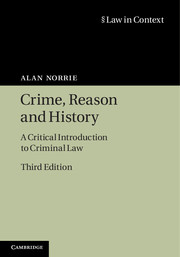Book contents
- Frontmatter
- Dedication
- Contents
- Preface to the third edition
- Preface to the second edition
- Preface to the first edition
- Table of cases
- Table of statutes
- Prologue: A brief history of the ancient juridical city of Fictionopolis
- Part I Context
- Part II Mens rea
- Part III Actus reus
- Part IV Defences
- 8 Necessity and duress
- 9 Insanity and diminished responsibility
- 10 Self-defence
- 11 Loss of control
- Part V Concluding
- Bibliography
- Index
8 - Necessity and duress
Published online by Cambridge University Press: 05 October 2014
- Frontmatter
- Dedication
- Contents
- Preface to the third edition
- Preface to the second edition
- Preface to the first edition
- Table of cases
- Table of statutes
- Prologue: A brief history of the ancient juridical city of Fictionopolis
- Part I Context
- Part II Mens rea
- Part III Actus reus
- Part IV Defences
- 8 Necessity and duress
- 9 Insanity and diminished responsibility
- 10 Self-defence
- 11 Loss of control
- Part V Concluding
- Bibliography
- Index
Summary
The point is simply that the criminal law should express the way we live. Our culture is built on the assumption that, absent valid claims of excuse, we are accountable for what we do. If that cultural presupposition should someday prove to be empirically false, there will be far more radical changes in our way of life than those expressed in the criminal law.
(Fletcher, 1978, 801–2)Blackstone shared his contemporaries’ view that much criminal activity resulted from social conditions … Characteristically, however, he shied away from the conclusion that poverty or exposure to vice and evil companions stripped one of a truly free will. That conclusion (for which he provided no logical rebuttal) he regarded as dangerous to the public order. Poverty, he asserted, ought not to ground a defence of involuntarism or of necessity, especially in cases of theft of food or clothing.
(Green, 1985, 296)Introduction
The contradictory impulses behind the criminal law are nowhere better illustrated than in the area of defences and, in particular, in the two parallel defences of necessity and duress. Paradox reigns here in abundance. We have a well-recognised defence of duress, but the judges cannot make up their minds as to whether it ought to be allowed for all crimes. The House of Lords took the unusual step of overruling itself on this question in Howe (1987), holding that the defence could not be available on any murder charge. More recently, it conceded that it was logically irresistible that the defence should be so available, but indicated that such a logic should be resisted (Hasan (2005) at [21]). At the same time, judges have expressed unease as to why there should be such a defence at all: duress ‘is difficult to rationalise or explain by reference to any coherent principle of jurisprudence’ (Howe (1987) at 783) (see also Lynch (1975) at 679). Why should the defence of duress cause such problems for criminal law theory?
- Type
- Chapter
- Information
- Crime, Reason and HistoryA Critical Introduction to Criminal Law, pp. 199 - 236Publisher: Cambridge University PressPrint publication year: 2014



